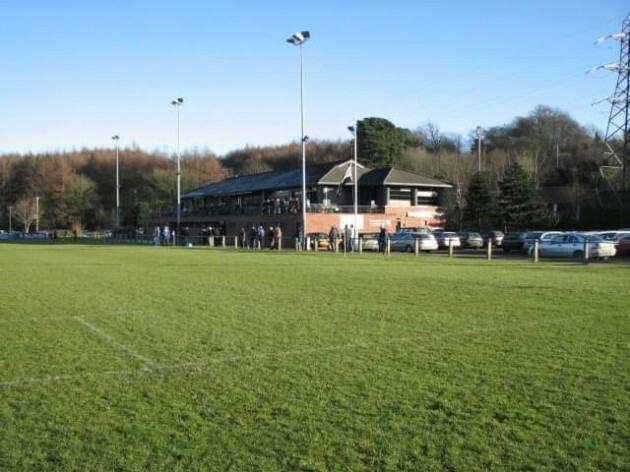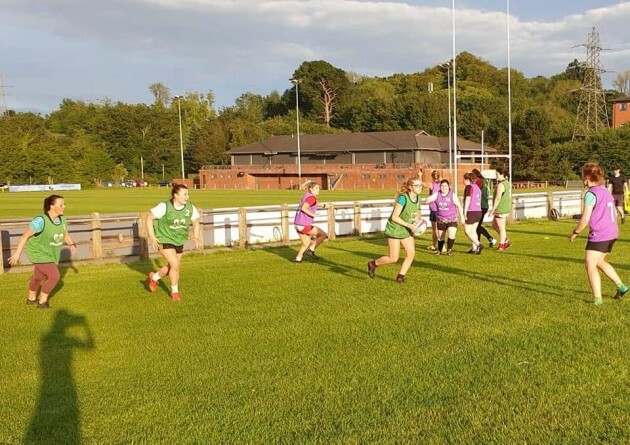‘TRAILBLAZERS’ IS OUR new series, telling the unheard stories of the women who fought for recognition in Irish rugby, and those who brought the sport to where it is today.
With Guinness – a proud sponsor of the Women’s Six Nations – The42 is paying tribute to their achievements, shining a light on the challenges they overcame, and looking ahead to what’s next for women’s rugby in Ireland.
In the third instalment, Daire Walsh remembers Rosie Stewart, an influential figure in women’s rugby in Ulster until her life was tragically cut short.
There’s a whole group of us who played together in Cooke with Rosie and we all still miss her. I don’t know how to express it, but she was someone very special. She touched a lot of people” – Jill Henderson
It may be coming up on 18 years since her untimely passing, but the legacy of former Ireland international Rosie Stewart continues to endure.
A magnetic presence on the field of play as an openside flanker, she also helped to put female rugby players on the map in the northern province as chairperson of both the Ulster and Cooke women’s committees.
Such was her contribution to the cause that, in 2004 – just a few months after she lost her brave battle with cancer – the Rosie Stewart Memorial Bowl (also known as The Rosie Stewart Cup) was formed. This would quickly become the pre-eminent cup competition for women’s rugby in the province of Ulster.
“Rosie was just an amazing character,” her former playing colleague Jill Henderson – the first captain of an Ireland women’s team – acknowledges.
“She was a fantastic person – very positive. I was very lucky to be a very close friend of hers and spend a lot of time with her. She’s a good example of what impact one person can make on so many people. The Rosie Cup is really good because it keeps her memory alive, although we’re not going to forget her.”
On and off the field talents
A Derry native who first caught the rugby bug while studying geophysics at Leicester University, Stewart (playing under her maiden name Rosie Gallagher at the time) made her Ireland debut in a Five Nations Championship defeat to France in February 1999. In total, she earned four international caps in the green jersey.
However, it was off the field of play where she undoubtedly had the greatest impact.
At this point in time, opportunities were limited for female rugby players across the island of Ireland. This was particularly true for the province of Ulster and remained to be the case during the early days of the Ireland Women’s Rugby Football Union – with whom Stewart was heavily involved for a number of years.
Having initially attempted to establish a link with North of Ireland FC – located on the Ormeau Road, within earshot of Kingspan Stadium in Belfast – Stewart and a handful of others travelled a few miles up to road to start a women’s team at Cooke in 1992.
When future Ireland player and team manager Rachel Reid joined Cooke in the winter of 1994, Antrim and Randalstown were the only other clubs with dedicated women’s sides.
“We wouldn’t have won very many games in those days, but we had great morale because we weren’t used to winning anything,” Reid remembers.
We just created a fantastic atmosphere of keeping everyone positive, enjoying the rugby and the social side as well. So we kept things going through the days where we didn’t win much. We had the same core team for four or five years.
“We had a couple of influential players like Rosie and Jill Henderson. We also had a few players who had already played internationally by that stage such as Frances Doherty, who was captain when I joined.”
Slowly but surely, Stewart inspired Cooke to rise up the domestic women’s ladder before they reached their zenith in the 1998/99 season. Under the guidance of coach Johnnie Neary, they secured an All-Ireland League and cup double.
This coincided with a major shift in attitude from the club’s hierarchy, with Stewart – who, as well as being chair of the women’s committee, helped Neary in the running of the team – front and centre in the quest to get her troops on an equal footing with their male counterparts.
“‘That was around the time we became full playing members and full voting members of Cooke. Before that we had been associate members. Rosie was our chairperson, so she would have been always the one to liaise with the men’s committee in Cooke.
“She would have been very instrumental in building the relationship between us and the club. It was a long time before we really felt part of the club and I don’t really know if it was anyone’s fault in particular. The guys trained on a Tuesday and a Thursday, we trained on a Wednesday and a Friday. We didn’t really ever see them. They played on Saturdays, we played on Sundays.
“It had been a big effort to actually feel part of the club and an effort on everyone’s part. Because of the nature of it, we had to train on different days to get pitch space as there was only so much pitch space with lights for training.”
An instrumental figure
It wasn’t just at club level that Stewart exerted an influence as she was also a driving force behind the setting up of an Ulster women’s team in late 1995. Despite being predominantly made up of Cooke players, they defeated Leinster in their first competitive game at the beginning of the following year.
By the summer of 2001, Ulster were back-to-back interprovincial champions and had a sizeable cohort of players on the Ireland squad.
She would have been very instrumental in starting the Ulster team,” Reid says of Stewart. “Herself and Johnnie Neary were there at the start and Karen Eagleson. If anything needed to be organised, she would have done it.”
In order to get the kind of recognition that she felt was deserving of the female oval ball stars in the province, Stewart realised she had to think outside of the box. Even though the All-Ireland Women’s League operated without a sponsor in those days, she saw no reason why Cooke and Ulster had to continue without one.
In the spring of 2000, Stewart negotiated a a first-ever jersey deal for Ulster women.
“She was very persuasive,” Reid explains. “Very influential in that she could go to different businesses and charm them into giving her money. She was always very good at writing a business case. Writing up the documents for what we were about.
“Also arranging the PR, to make sure that everyone was happy and everybody got what they needed from the arrangement. She was just a very good example of how to run a club – how to do the paperwork and how to progress.”
Illness
In 2002, all was going well for Stewart from both a personal and professional perspective. She was busy planning her wedding with fiancé Adrian Stewart and had secured a job with a pipe rehabilitation firm in Banbridge, Co. Down.
Unfortunately, priorities shifted dramatically when Rosie received a diagnosis of breast cancer shortly after taking on this new role. With a punishing road ahead, her marriage to Adrian was brought forward from an original summer date so the ceremony could take place before she began chemotherapy treatment.
Despite this devastating news, Rosie continued to live life to the fullest. In addition to taking part in a sponsored swim to raise money for Action Cancer, Reid recalls her still being a pivotal figurehead in rugby circles.
However, Stewart passed away at the tender age of 33 on 16 August, 2003.
“She was still chair of the Ulster committee,” says Reid. “I remember in July 2003, just three or four weeks before she died, she rang me and asked me if I would chair the next meeting because she wasn’t well and wasn’t sure if she would make it. She was still trying to run it until a few weeks before she died.”
There was an outpouring of emotion throughout the Irish rugby community after her untimely death. Just under two months later, a match was held in her honour between a Banbridge XV and an Ulster Classics side, with all donations going towards the Ulster Cancer Foundation.
Had it not been for her illness, Reid believes Stewart could have gone on to break down further barriers within the sport.
She was the driving force for getting Ulster women’s rugby moving at the start. She was a huge part of it. She would still be chair if she was here today. She’d probably be President of City of Derry, Cooke or someone else, and she’d be an amazing one at that.
“That’s if she had gone that way, which I think she would have because everybody loved her. She had such a good way of getting on with everybody. As well as being very, very organised and sociable. She was one of a kind.”
Through the advent of the Rosie Stewart Memorial Bowl, her memory still lives on to this day.
Her club Cooke were to be its inaugural winners, with many of her former team-mates featuring in their final success over Enniskillen. This was a fitting tribute to someone who had soldiered for the cause of the Belfast side over so many years.
Carrying the ball forward
Reid accepts more needs to be done to build on the foundations that were laid by her close friend – someone she was proud to count as a team-mate in the club, provincial and international grades. Cooke have flown the flag relentlessly for Ulster in the All-Ireland League, but only Queen’s University and Malone have joined them in the past decade.
Queen’s had a single-season stint in the Women’s AIL back in 2015/16, with Malone entering the national ranks for the ultimately curtailed 2019/20 season.
“Teams in England, they seem to be becoming very, very professional,” Reid adds. “I read an article from one of the Irish girls who is playing at Sale Sharks [Lauren Delany], saying that the women have the exact same facilities as the men. The exact same availability for medical treatment and training facilities, and all the rest of it.
“If you look at the facilities of the Ulster men’s team, who are fully professional, I would have absolutely loved that. Not necessarily for making money, but to have the opportunity to train every day, all day. Just to have all that high standard back-up support, to make you the best player you can be and the best team you can be.
I think the club and province has gone up massively since my day, but the women’s teams in Ireland are still way behind in terms of professionalism.”
Whatever challenges may lie in wait, however, women’s rugby in Ulster now finds itself in a much healthier state.
This is thanks in no small part to Stewart’s tireless work behind the scenes to raise its profile and turn it into a viable entity within the sporting landscape in the north.


